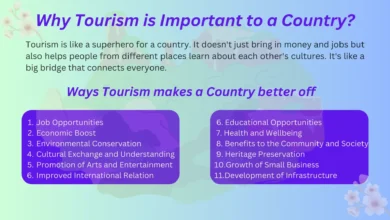
The Importance of Marketing in Tourism
The importance of marketing in tourism is that it encourages people to visit new places, thereby boosting the local economy and allowing people to enjoy the experiences that this industry offers.
Marketing has a crucial role in promoting communities by encouraging visitors to discover new destinations and acting as an engine for tourism. The critical role that marketing plays in the tourist industry is explored in this piece, which also emphasizes the significance of social media interaction, narrative, high-quality content, customer retention, the influence of reviews, and the importance of keeping up with digital trends. In this article we highlight the importance of marketing in tourism as follow:
Importance of Marketing in Tourism
Great Content for More Visitors
Tourism marketing is about producing content that draws visitors on its own, not merely about throwing money at it. Low-cost methods of increasing traffic include search engine optimization (SEO) and social media marketing. It highlights how marketing makes tourism firms financially stable. This organic traffic is like a financial lifeline for many businesses.
Building a Strong Brand with Content
Tourism businesses can showcase their personalities through content creation. In a field where initial impressions are crucial; this is quite important. For prospective buyers, a brand feels more authentic when it produces engaging content. Research indicates that individuals value a genuine social media presence, which affects their perception of customer service and whether or not they suggest a company.
Personalized Experiences for Success
In tourism, marketing is the engine behind sales and customer loyalty. Tailoring experiences to individual needs makes a business stand out. Marketers play a crucial role in crafting unique and memorable customer experiences, creating a sense of connection that encourages people to come back.
Story Telling
In a crowded market, telling a good story is key. Tourism marketing uses storytelling to make a lasting impression on potential guests. Through platforms like blogs, podcasts, and social media, businesses can share stories about their offerings and happy guests, forming a lasting connection with their audience.
Social Media Connections
The importance of marketing in tourism is clear when it comes to building connections with the target audience. Engaging with potential customers on social media helps create relationships that lead to bookings and visits. A mix of marketing methods, including SEO, traditional ads, and a strong social media presence, helps businesses stand out in a competitive field.
Promotion for Visibility
Marketing is the key to making sure people know about tourism businesses. Without effective marketing, even the best offerings might go unnoticed. From traditional advertising to creative approaches like social media marketing, a well-planned marketing strategy ensures the business is visible and interesting to people.
Emails for Happy Customers
Keeping customers happy is crucial in tourism. Email campaigns play a big role in maintaining customer satisfaction, reminding them of why they chose a particular business. Happy customers are not only likely to come back but also to recommend the business to others, making marketing an investment in long-term success.
Reviews Matter
Reviews hold a lot of sway in the tourism industry. Positive reviews draw in new customers, while negative ones can turn them away. Effective marketing strategies should include ways to encourage positive reviews, whether through exceptional service, engaging content, or other customer-focused efforts.
Personal Touch
In the tourism and hospitality industry, marketing is everything.what drives sales and keeps customers coming back for more. A personal touch can make all the difference in this industry, and that why marketing is so important. As a result, marketers in this industry can help their companies thrive by creating unique customer experiences tailored to each individual needs. To understand these intricacies, it is necessary to understand the importance of marketing in tourism.
Adapting to Digital Changes
The tourism industry is always changing with new technology. Recognizing the importance of marketing helps businesses navigate these changes. Understanding how technology influences what customers do, adjusting marketing plans accordingly, and embracing digital trends are essential for staying competitive and growing.
Conclusion
Marketing is incredibly important in tourism. From bringing in natural traffic through great content to showing off a unique brand through storytelling and social media, effective marketing strategies are the backbone of success in the tourism sector. Customer retention, positive reviews, and adapting to digital trends all highlight the crucial role marketing plays in ensuring long-term growth and viability. In a world where being seen and connecting with customers are crucial, investing in marketing is not just helpful but necessary for the success of tourism-related businesses.




